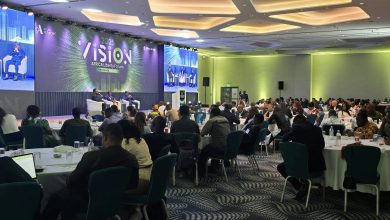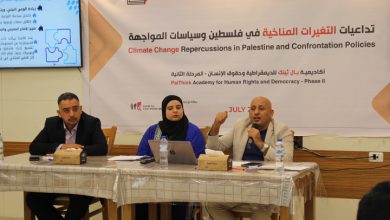A Special Meeting with The Head of the Hamas International Relations Department

[highlight]Gaza, Wednesday 23rd of January 2013 [/highlight]
Preface
Palthink for Strategic Studies hosted Osama Hamdan the International Relations Officer of Islamic Resistance Movement (Hamas). The two-hour special meeting was attended by more than 200 people representing civil society figures, activists, academicians, representatives of the Christian community, representatives of political parties, journalists and social media activists, youth and women. The meeting comes as part of Palthink‘s effort to address issues of significance to the Palestinian and International levels through building a bridge between decision makers and the society.
Opening
Omar Shaban, the director of Palthink for Strategic Studies, who moderated the session , welcomed the guests, and put forward a number of questions that pivoted around significant issues like, the new changes sweeping across the Arab World, the conflict in Syria, the Israeli elections, the Palestinian-Israeli peace negotiations in case they were resumed, the performance of Hamas government in Gaza and the principle of accountability and Fatah movement anniversary celebration that took place in Gaza a few weeks ago.
Hamas and the International Community
“Hamas is open to the entire world,” with these words Osama Hamdan described Hamas doctrine in dealing with the world. He recognized the significance of the international context in affecting the reality of the Middle East in general, and the Palestinian issue in particular.
Hamdan pointed out that Hamas was regarded by the United States of America as a terrorist organization and was included in designated terrorist organizations list in 1993. Hamadan also referred to the European Commission position which took similar step in 2003. However, Hamas held several meetings with a number of European political figures from various European capitals as the EC decision was binding all kinds of relations with Hamas only to the European institutions, and not to the EU member states. Hamdan explained.
“We had talks with 12 European countries,” Hamdan stated. He also referred to “channels of communication” with the American Administration which were stopped because of having them known by the public.
He also added that Hamas movement did not confine its relations to the West but also opened up to the rest of the world and established relations with China, Russia, South America, Africa and some Islamic countries in East Asia like Malaysia and Indonesia.
Addressing the significance of the Palestinian issue and its relation to the world. Hamdan stated that “ending occupation will contribute in promoting international stability.”
In this context of Hamas’s relations with the West, Hamdan mentioned that the West encouraged Hamas to participate in the Palestinian legislative council elections of 2006 and asked Hamas to accept the results of the elections. When Hamas won the elections, he added, the West made a decision to besiege and boycott the government formed by Hamas and imposed three conditions to deal with Hamas. The conditions, according to Hamdan, were recognizing Israel; recognize the previously signed agreements between Israel and the Palestinian Authority, and to renounce violence.
“The West should not impose conditions to talk with any of the Palestinian parties and should accept them as they are without thinking about reformulating them in accordance with its interests. Hamas will not recognize Israel and it refuses to negotiate with Israel, but if the international community wants us to negotiate, we should first revise the track of negotiations which continued more than twenty years without yielding any results and this should happen for the good of the Palestinian people” Hamdan elaborated.
The Syrian Crisis
With regard to the current conflict in Syria, Hamdan pointed out that Hamas made great efforts for not involving the Palestinians in the ongoing conflict in Syria and condemned the Syrian regime’s killing of both the Palestinians and the Syrians. “Hamas is moving at all levels to stop the Syrian Regime’s targeting of the Palestinian refugee camps in Syria, especially in Al-Yarmouk camp and to oust the Palestinians from the equation of the conflict.” He said.
Hamas Position from the Israeli Elections
In his answer to the question about the Israeli elections, Hamdan said that there are differences between the Israeli rightist and leftist parties; however, the strategy of the “Israeli entity,” according to Hamdan, is one. Hence, any Israeli party comes to power will follow the same strategy which is to continue the occupation of the Palestinian land and the oppression and deportation of the Palestinian people.
He also expected Benjamin Netanyahu to preside over the next Israeli government and to continue his same old policy if not becoming even more strict as a result of the new political agenda and this, Hamadan added, entails that the Palestinians should expedite the Palestinian reconciliation to stand as one people against the Israeli occupation and they as well as the Arabs should sever all ties with the occupation.
Back to Negotiations?
In his comment on the possibility of the Palestinian President Mahmoud Abbass’ “back to negotiations” option, Hamdan called for rethinking the entire peace process. “There is something wrong with this long peace process. We call for a comprehensive national rethinking of the peace process. We need to a fair and balanced evaluation of the peace process in order to decide the next step,” Hamdan stated.
Evaluation of Hamas’ Gaze Government Performance
With Regard to a question about Hamas’ evaluation of the performance of its government in Gaza, Hamdan stated that “We are not an impeccable movement,” referring to Hamas movement. He added “The core idea of being involved in governance is to serve the Palestinian society. Thus, there is nothing wrong with reviewing the performance of our government in Gaza as we do not claim that we are a movement that does not commit mistakes.”
Fatah Rally
Hamadan emphasized the significance of Fatah movement. He said that it is normal to see Fatah’s masses in the latest rally. Hamdan said that Hamas did not repress the Fatah masses and that he was “happy” to see the scene of the rally taking place within a “tolerant” and “harmonious” atmosphere.
Discussions
Hamda’s speech was followed by a hot discussion as the attendees addressed significant issues such as national unity and reconciliation talks, latest arrest of journalists in Gaza, elections.
Hamdan emphasized Hamas’s commitment to national reconciliation as he mentioned “major progress” to take place in February referring to the excepted Cairo talks to be held in February. “We will not accept division,” he said, and added “ending political division does not necessarily mean the presence of one absolute political program…reconciliation means having the basic foundation for victory…it means a unified position against Israel and this was proved during the last aggression when Palestinian stood unified and Israel was forced to cease fire.”













